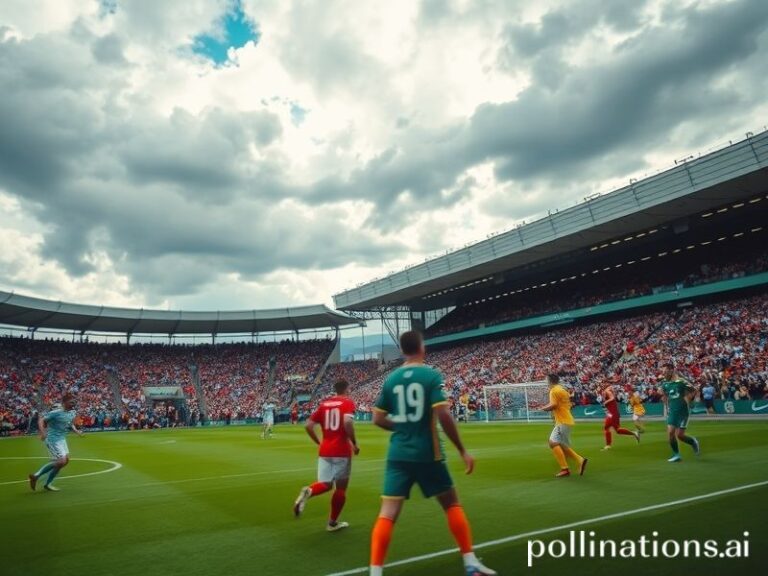Houston as Planet Earth’s Beta Test: Disaster Capitalism, Immigrant Ingenuity, and the Sweet Smell of LNG
HOUSTON, WE HAVE A PROBLEM—AND A PARADE
They used to say everything in Texas was bigger. Having spent the last decade filing dispatches from shrinking post-industrial towns, flooded Pacific atolls, and European capitals that now double as open-air museums to their own relevance, I can confirm: Houston is still enormous, still sweating, and still acting like the 21st century is merely a software update away.
From a safe remove—say, a café in Copenhagen where the barista lectures you on hygge while the sea quietly reclaims the bike racks—Houston looks like humanity’s control experiment: take hydrocarbons, endless concrete, and a zoning code best described as “thoughts and prayers,” then hit fast-forward. The result is a city that builds 10,000 new homes a year on former flood plains while politely asking hurricanes to work remotely.
Internationally, Houston matters because it exports two things the planet can’t quit: molecules and myth-making. The molecules are obvious—petrochemical plants ringing the Ship Channel like dystopian Christmas lights, feeding the world’s plastic habit one nurdle at a time. The myth-making is subtler. Houston is where boosterism meets brute geology and convinces itself the party can last forever, provided you install bigger air-conditioners. Watching officials toast “resilience” at ribbon-cuttings held six inches above sea level is like watching Rome throw a toga party while the Visigoths RSVP “maybe.”
Yet the city keeps minting global knock-on effects. Every time a tanker of liquefied natural gas leaves Freeport, European ministers scramble to update their spreadsheets on how quickly they can freeze Putin out of the chat groups. Every time a medical breakthrough emerges from the Texas Medical Center—largest in the world, as locals will remind you between bites of brisket—pharmaceutical giants in Basel and Hyderabad start recalculating patent timelines. Houston, in other words, is the place where the Global South’s climate bill and the Global North’s retirement fund sit awkwardly at the same oyster bar, arguing over who forgot the Tabasco.
The demographics, too, are a preview of coming distractions. Walk the aisles of Fiesta Mart on Bellaire and you’ll hear Spanish, Vietnamese, Swahili, and a West African French that makes Paris sound provincial. One in four Houstonians was born abroad, a statistic certain European nativists would find horrifying if they could locate Houston without Google. The city’s genius lies in turning immigration into infrastructure: yesterday’s refugee becomes today’s chemical engineer, tomorrow’s strip-mall landlord, next week’s voter who still can’t believe snow is real.
Of course, no one actually walks the aisles of Fiesta Mart; this is a city where cars reproduce by mitosis. Which explains why, when the next Category-whatever arrives, the evacuation plan looks less like Dunkirk and more like a parking lot cosplaying as a river. International audiences watch those aerial shots of submerged freeways with the same voyeuristic relief Italians once reserved for Naples garbage strikes—glad it’s not us, yet.
Still, dismissing Houston as mere hydrocarbon hubris is too easy. The same week the IPCC issues another politely worded obituary for coral reefs, Houston quietly flips on its 1.2 millionth rooftop solar panel—proof that even the oil capital hedges its bets when the accountants start sweating. Venture funds from Riyadh and Singapore now prowl the halls of Rice University, shopping for carbon-capture startups they can green-wash into IPO gold. Irony, like humidity, is thick here.
So what does Houston tell the rest of us, nursing our espressos on higher, drier ground? That the Anthropocene will be improvised, air-conditioned, and heavily leveraged. That resilience is just another word for “we’ll probably figure it out once the insurance check clears.” And that somewhere between the gospel brunch and the next 500-year flood, humanity will continue its grand tradition of building cathedrals to the very forces that will eventually wash them away—then charging admission to the ruins.
As I board my flight out, the pilot cracks a joke about the asphalt temperature. The cabin laughs, a brittle international chorus already forgetting the wetlands beneath us, already planning the next layover. Houston recedes, shimmering like a fever dream financed by cheap debt and deferred maintenance. See you at the after-party, Earth. Bring galoshes.







